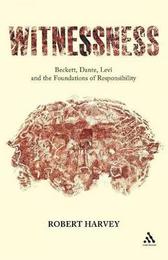
|
Witnessness: Beckett, Dante, Levi and the Foundations of Responsibility
Paperback / softback
Main Details
| Title |
Witnessness: Beckett, Dante, Levi and the Foundations of Responsibility
|
| Authors and Contributors |
By (author) Prof Robert Harvey
|
| Physical Properties |
| Format:Paperback / softback | | Pages:176 | | Dimensions(mm): Height 216,Width 138 |
|
| Category/Genre | Literary studies - general |
|---|
| ISBN/Barcode |
9781441124241
|
| Classifications | Dewey:809 |
|---|
| Audience | | Professional & Vocational | |
|---|
|
Publishing Details |
| Publisher |
Continuum Publishing Corporation
|
| Imprint |
Continuum Publishing Corporation
|
| Publication Date |
21 October 2010 |
| Publication Country |
United States
|
Description
Witnessness posits a universal ethics based neither on rational mental structures nor on moral principles, but on the extra-rational powers of the imagination. Harvey pursues this ethics by staging a speculative reading of Samuel Beckett's "untranslatable" text, Worstward Ho, alongside Dante's Purgatorio and Primo Levi's The Drowned and the Saved and If This Be a Man. Many of the thirty concise chapters that compose Witnessness are built upon notions whose names (e.g. dimness, lessness) take inspiration from Beckett's unique and precise vocabulary. Harvey explores the particular experience of the witness as recounted in Dante and Levi-for signs of a general, common, and innate witness-like attitude that protects the other and that we see expressed in Beckett's penultimate prose piece.
Author Biography
Robert Harvey is Distinguished Professor in the Department of Cultural Studies and Comparative Literature at Stony Brook University, USA. His teaching ranges from literary and film theories to modern and contemporary literatures and the interpenetrations of literary and philosophical discourse. His 2010 book published by Continuum/Bloomsbury, Witnessness: Beckett, Levi, Dante and the Foundations of Ethics appeared in French as Temoignabilite (Geneva: MetisPresses, 2015). He is a major co-editor of the OEuvres completes of Marguerite Duras (Paris: Gallimard, 2011, 2014). Harvey was a Program Director at the College International de Philosophie, 2001-2007.
ReviewsA wise and passionate book, whose fundamental ambition - to develop an effective universal ethics - is compellingly accomplished. The conviction with which Harvey establishes Samuel Beckett's rightful place at the heart of this undertaking is thrillingly persuasive. Harvey's thinking is as committed as it is attentive, his readings full of care and insight. This is an inspiring achievement. * Martin Crowley, University Senior Lecturer, Department of French, University of Cambridge, UK * A witty ethics? Who would have thought it possible? Yet this is just what Robert Harvey gives us in his brilliant Witnessness. With Beckett-like bilingual virtuosity, Harvey invents, stage-manages, and animates a philosophical theater in which, not merely spectators but actors as well, we might learn to move beyond the dreary monolingualism that passes for politics--in which we might learn, as Harvey puts it with characteristic wit and ethical force, to be beside ourselves. * Joseph Litvak, Professor of English, Tufts University, USA * The last sentinel of witness consciousness, Robert Harvey locates the knocked out ethical transmitters that populate our 'litterature' and continue to signal, if dimly, from the late works of Samuel Beckett as well as those of Dante and Levi. Staying close to the ethical breach, the work travels the edges of translation as an essential philosophical stance. Harvey's grasp redeems purposefulness and refuses to shutter the house of being. Bright with humanist replenishment, Witnessness stares down the darker regions of my own intractable dwellings. The reader should be prepared for jolts of joyfulness! * Avital Ronell, University Professor of the Humanities, Co-Director of Trauma & Violence Transdisciplinary Studies, New York University, USA, and Jacques Derrida Professor of Media and Philosophy, European Graduate School, Switzerland * In the name of the universal, Robert Harvey's extraordinary book invents and performs an absolutely singular ethics through a practice of reading beyond scholarship, across more than one language, brilliantly weaving Beckett with Primo Levi and Dante, Blanchot and Derrida with Lyotard, in a poetic text of great virtuosity that leaves one both devastated and hopeful. * Geoffrey Bennington, Asa G. Candler Professor of Modern French Thought, and Chair, Department of Comparative Literature, Emory University, USA *
|